iPhone 13 Pro vs 14 Pro Camera: Comparing the Camera Capabilities
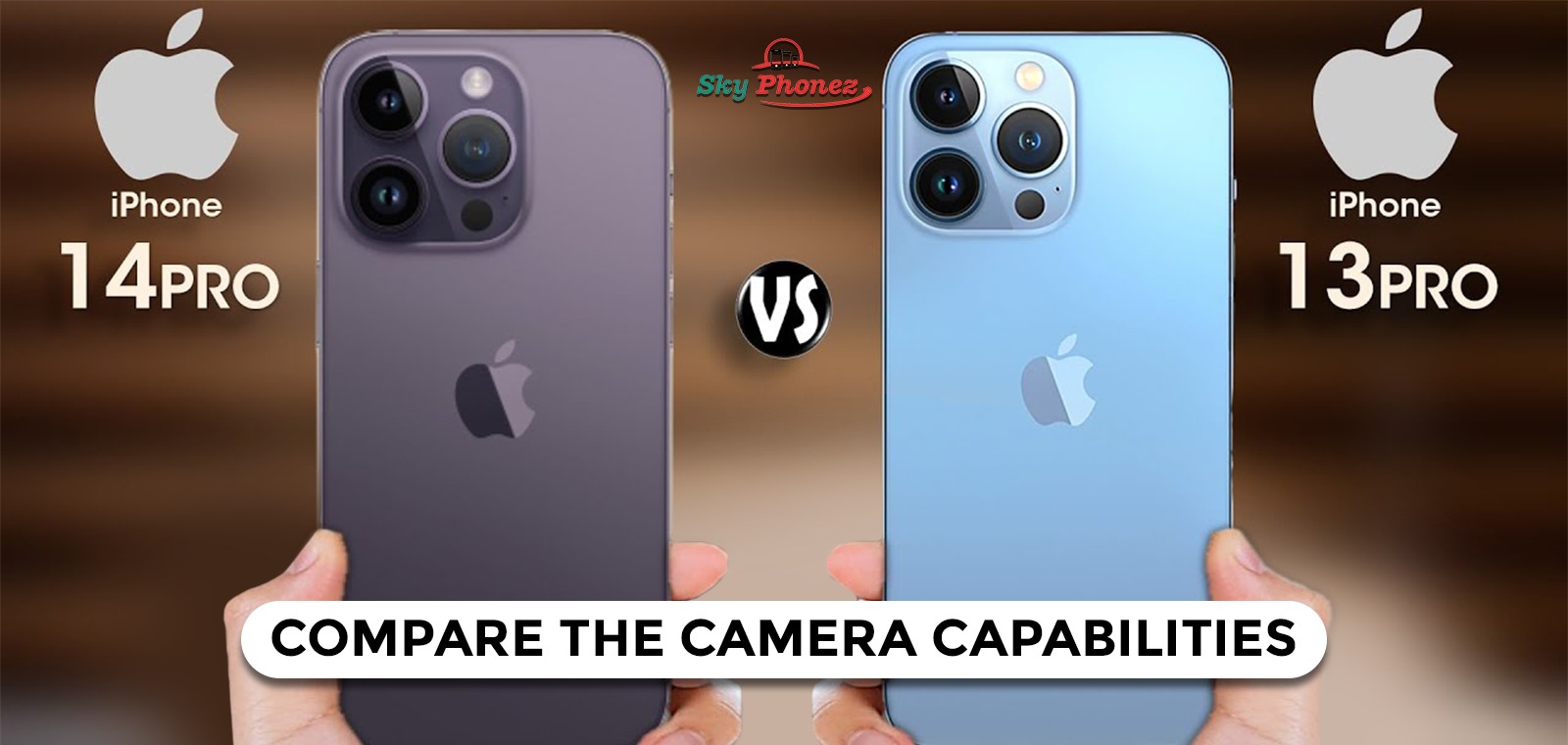
Are you a pro photographer who appreciates the lens power offered by Apple in these flagships more than anything else?
Or you are a true iPhone fan who wants to impress everyone with some breathtaking clicks that blow everyone with surprise.
Well, here’s the good news.
Whatever the case might be, the iPhone 13 Pro and iPhone 14 Pro are exceptional smartphones with advanced camera systems that cater to both professional photographers and photo enthusiasts alike.
This article delves into a detailed comparison of their camera capabilities, focusing on sensor size, resolution, low-light performance, video recording features, and overall camera performance.
Are you excited to learn about the best these camera phones have to offer?
Let’s get started.
Key Takeaways
- The iPhone 14 Pro features a new 48-megapixel sensor that offers higher resolution and more detail compared to the 13 Pro’s camera.
- Larger sensor size in the 14 Pro contributes to better low-light performance and improved image quality in dim conditions.
- The iPhone 14 Pro introduces a 2x optical zoom capability using its 48-megapixel sensor, providing additional versatility in photography.
- Action Mode has enhanced the video recording on the iPhone 14 Pro, delivering smoother and more stable footage.
- While the iPhone 14 Pro boasts significant camera improvements, the iPhone 13 Pro remains a strong contender with its own set of advanced features.
Sensor Size and Resolution: Game-Changing Hardware Talents
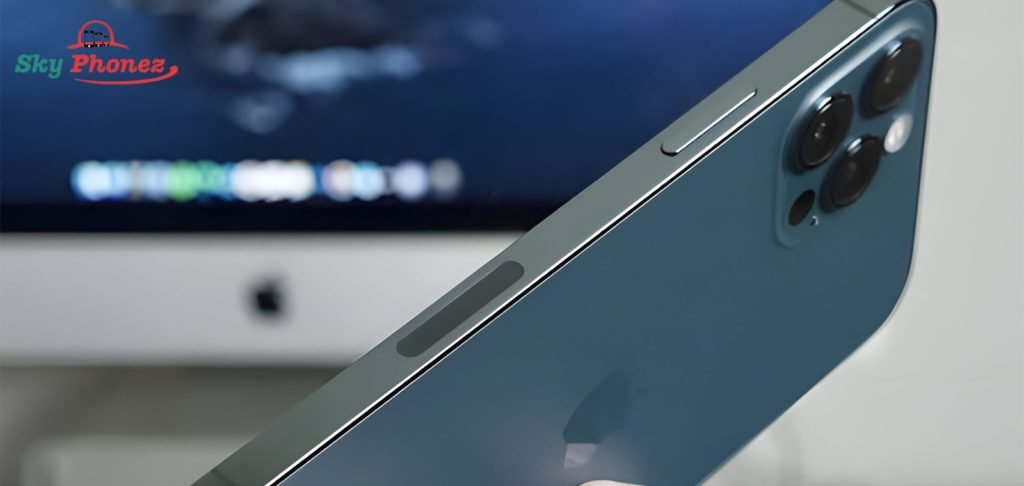
The Leap to 48 Megapixels: A Closer Look
With the introduction of the iPhone 14 Pro, Apple has made a significant leap in camera resolution, moving from the 12 megapixels found in previous models to massive 48 megapixels. That’s an impressive 4x jump, something that catches everyone’s attention right away.
The quad-pixel technology captures four times more detail in an image. The 12-megapixel photos that the lens captures are scaled up to 48 megapixels. You can also take 48-megapixel pictures with the ProRaw feature which is insanely amazing, setting a new standard for mobile photography.
This increase not only translates into more detailed photos but also enhances cropping flexibility without compromising image quality.
An increase in megapixels alone in a camera doesn’t reflect in an inspiring photo quality. Therefore, a higher resolution sensor is complemented by Apple’s advanced image processing, which ensures that the increase in pixels does not lead to a decrease in overall photo quality due to noise.
The larger pixel count paired with sophisticated algorithms allows for improved texture and clarity in images.
Here’s a quick comparison of the iPhone 14 Pro’s camera specs against its predecessor:
| Feature | iPhone 13 Pro | iPhone 14 Pro |
| Resolution | 12 MP | 48 MP |
| Aperture | f/1.5 | f/1.78 |
| Lens Equivalent | 26 mm | 24 mm |
The table highlights the key differences in camera hardware, showcasing the iPhone 14 Pro’s edge in resolution and lens specifications. As users compare iPhone models, they will find that the Apple iPhone 14 Pro Camera is a game-changer in terms of sensor size and resolution.
Comparing Sensor Sizes: Why Bigger Can Be Better
When it comes to smartphone cameras, the sensor size plays a pivotal role in image quality. A larger sensor has the ability to capture more light, which is crucial for producing clearer and more detailed photos, especially in low-light conditions. The iPhone 14 Pro’s sensor is a significant step up from its predecessor, offering improved performance in various lighting scenarios.
The advantages of a larger sensor include not just better light-gathering capabilities, but also a shallower depth of field, which allows for more pronounced background blur, or ‘bokeh’, in your photos. This makes the object stand out more and gives a professional look to your images.
The larger sensor size of the iPhone 14 Pro not only enhances photo quality but also contributes to the device’s improved 2x optical zoom, providing sharper images even when you’re zooming in on distant subjects.
Here’s a quick comparison of the camera hardware specs related to sensor size and zoom capabilities:
| Model | Zoom Level | Resolution | Aperture | Lens Full-frame Equivalent |
| 14 Pro | 2x | 48 megapixels | f/1.78 | 24 millimeters |
| 13 Pro | 2x | 12 megapixels | f/2.0 | 26 millimeters |
As you can see, the iPhone 14 Pro not only has a higher resolution but also a wider aperture, which allows for more light to enter the lens, further enhancing its low-light performance.
Besides the camera talents, the iPhone 14 also brings valuable security features that a lot of iPhone users will appreciate.
The 2x Optical Zoom Advantage of the iPhone 14 Pro
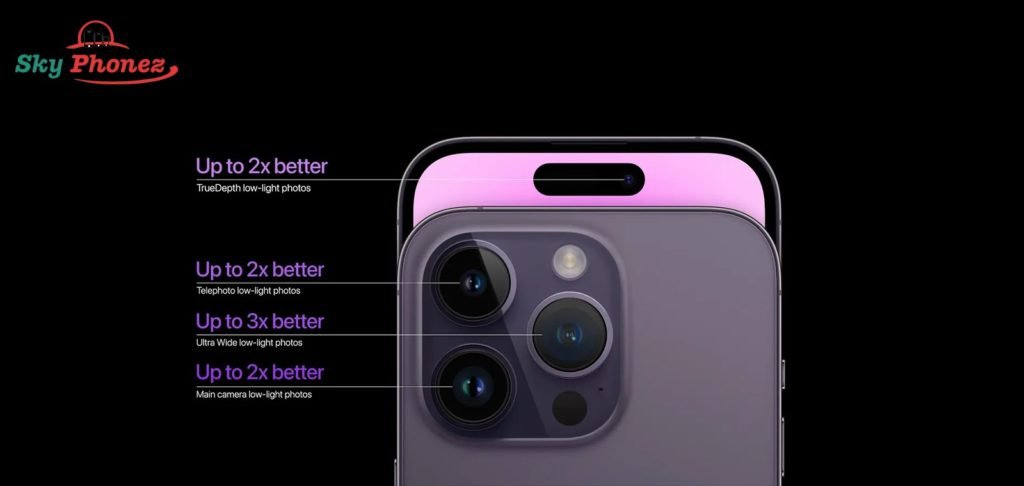
The introduction of the 2x optical zoom in the iPhone 14 Pro marks a significant enhancement in its camera’s versatility. This feature allows users to capture images at twice the magnification without any loss in image quality, a leap forward from the digital zoom capabilities of previous models. The optical zoom maintains the integrity of the pixels, ensuring that each shot is crisp and clear.
- iPhone 13 Pro: 3x optical zoom
- iPhone 14 Pro: 2x and 3x optical zoom
The dual optical zoom levels on the iPhone 14 Pro provide photographers with more creative freedom. Whether it’s a portrait or a landscape, the ability to switch between 2x and 3x zoom gives users the flexibility to frame their shots perfectly without moving closer or further away from the subject.
The 2x optical zoom also benefits video recording, offering stable and high-quality close-ups, which is especially useful for capturing dynamic scenes or subjects in motion. The iPhone 14 Pro’s camera system thus not only enhances still photography but also dramatically boosts the video recording experience.
For those who want to save money on the amazing camera powers, buy the iPhone 14 Pro refurbished in great working condition for an incredible experience.
Low-Light Photography: Impressive Results
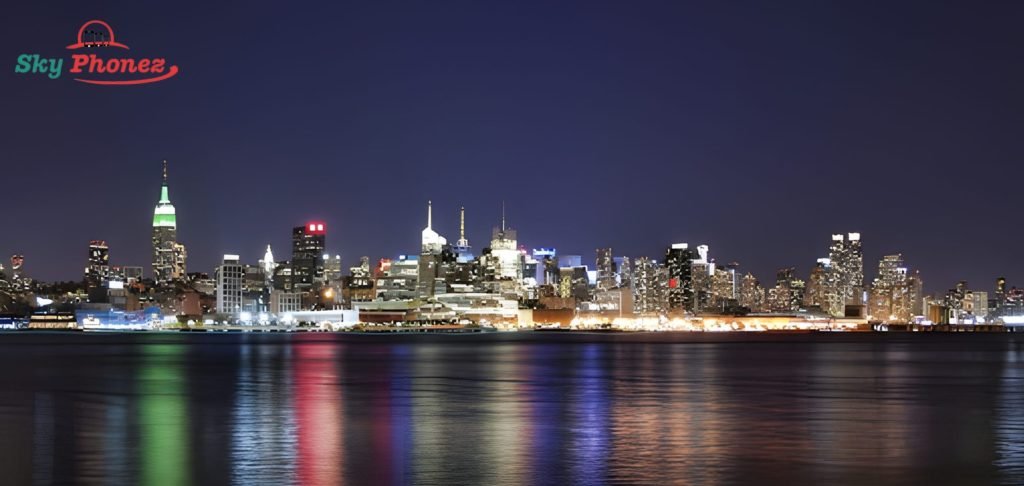
Night Mode
The iPhone 14 Pro and iPhone 13 Pro both offer Night Mode, a brilliant feature for capturing images in low-light conditions. The iPhone 14 Pro’s Night Mode takes advantage of its larger sensor and advanced image processing to deliver brighter and more detailed photos compared to its predecessor.
In dimly lit environments, such as theatres or restaurants, Night Mode becomes an indispensable tool. The iPhone 14 Pro’s ability to enhance brightness while reducing noise results produces stunning nighttime shots that rival even some dedicated cameras.
While both models perform admirably in the dark, the iPhone 14 Pro’s 48MP main sensor offers a significant edge. This higher resolution sensor not only captures more detail but also improves the overall clarity of the images, making it a substantial upgrade over the 13 Pro’s 12MP sensors.
Here’s a quick comparison of Night Mode performance between the two models:
| Feature | iPhone 13 Pro | iPhone 14 Pro |
| Sensor Resolution | 12MP | 48MP |
| Brightness Enhancement | Good | Better |
| Detail Capture | High | Higher |
| Noise Reduction | Effective | More Effective |
The Impact of a Larger Sensor in Dim Conditions
The iPhone 14 Pro brought with it a larger sensor, which has a significant impact on low-light photography. Larger sensors are capable of capturing more light, which is crucial in dim conditions where light is scarce. This results in photos that are not only brighter but also retain more detail and colour accuracy.
In a comparison of low-light performance, the iPhone 14 Pro’s sensor size gives it an edge over its predecessor. Here’s a brief look at how the two models compare in dimly lit environments:
- iPhone 14 Pro: Exhibits brighter images with vibrant colours and improved detail.
- iPhone 13 Pro: While still capable, it may produce images that are less bright and slightly less detailed in similar conditions.
The larger sensor of the iPhone 14 Pro doesn’t just enhance photo quality; it transforms the low-light photography experience, offering a noticeable improvement over the iPhone 13 Pro. The 13 Pro is a great iteration of the iPhone 13 family.
It’s important to note that while the larger sensor size contributes to better low-light performance, the overall image quality also depends on other factors such as the lens aperture, image processing algorithms, and stabilisation technologies. The iPhone 14 Pro’s advancements in these areas further complement its sensor capabilities, making it a fantastic tool for capturing images in challenging lighting scenarios.
Image Processing: The Big Strength of the 14 Pro
The iPhone 14 Pro marks a significant leap in image processing capabilities, introducing the Photonic Engine, Apple’s latest advancement in this domain. This new feature enhances photo quality in real-time, especially noticeable in low-light conditions where it dramatically boosts performance across all cameras.
The Photonic Engine leverages Deep Fusion technology earlier in the processing chain, which allows for more detail and less noise in the final image. This is particularly beneficial when editing, as the images retain a high level of flexibility for post-processing tweaks and adjustments.
The iPhone 14 Pro’s image processing advancements represent a substantial improvement over its predecessor, ensuring that even in challenging lighting, the photos maintain a professional quality with ease.
While the iPhone 13 Pro remains a strong contender with its ProRAW capabilities and LiDAR scanner, the 14 Pro’s new processing pipeline sets a new standard for mobile photography, blending hardware prowess with computational intelligence to deliver stunning results.
Video Recording Capabilities: Action Mode and Beyond
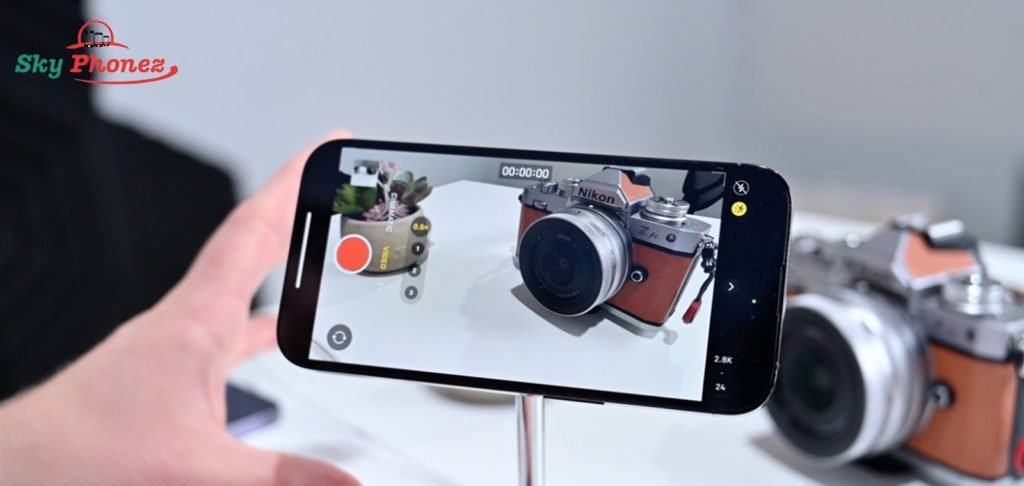
Introducing Action Mode: Video Shooting Redefined
With the introduction of the iPhone Action Mode, you can now capture dynamic videos with unprecedented stability. This sophisticated video feature is designed to enhance the quality of video recordings, especially when on the move. It’s a game-changer for content creators and casual users alike, who can now record smooth footage without the need for additional stabilization equipment.
Action Mode utilizes the iPhone’s advanced sensors to stabilize video, ensuring that even in the most active scenarios, the footage remains clear and undistorted. This is particularly beneficial for sports enthusiasts, vloggers, and anyone recording in motion.
The iPhone’s Action Mode represents a significant leap in mobile videography, offering users the ability to produce professional-looking videos directly from their smartphone.
While traditional video recording can be susceptible to shakes and jitters, Action Mode compensates for these movements, providing a seamless viewing experience. It’s a testament to Apple’s commitment to pushing the boundaries of what’s possible with smartphone cameras.
4K at 60fps: Comparing the Pro Models
When it comes to video recording, the iPhone 14 Pro and 13 Pro both offer 4K resolution at 60 frames per second, ensuring smooth and detailed footage. The iPhone 14 Pro, however, introduces new processing capabilities that enhance video quality.
- Both models support HDR video recording with Dolby Vision up to 60fps.
- The iPhone 14 Pro’s cinematic mode now supports 4K HDR recording at 30fps.
- ProRes video recording is available on both, but the iPhone 14 Pro allows for higher storage capacities, accommodating larger ProRes files.
The advancements in the iPhone 14 Pro’s video processing mean that not only is the resolution high but the colour accuracy and dynamic range are improved, bringing a more true-to-life viewing experience.
While the iPhone 13 Pro remains a strong contender in video capabilities, the iPhone 14 Pro edges ahead with its improved computational photography and video processing powers, which are particularly noticeable in demanding scenarios like low-light conditions or fast-moving action shots.
The iPhone 13 Pro release date is September 24, 2020. Buying a refurbished iPhone 13 Pro is a great option if you want to save money on hot deals available online.
The Evolution of Video Recording on iPhones
The iPhone camera has undergone a remarkable evolution since its inception, transforming the way we capture and share our lives. The journey from the original iPhone’s modest 2-megapixel camera to the sophisticated multi-lens systems of today illustrates a visual revolution that has placed professional-grade tools in the palms of iPhone users worldwide.
With each new iteration, Apple has successfully introduced features that have significantly enhanced the video recording experience:
- ProRAW and LiDAR scanner in the iPhone 13 Pro for professional-level detail and depth sensing.
- ProRes files and log recording in the iPhone 15 Pro Max, catering to the needs of professional videographers.
- The introduction of Dolby Vision HDR elevates colour accuracy and contrast to cinematic levels.
The iPhone’s video capabilities have not only kept pace with professional equipment but in some cases, have become the preferred choice for on-the-go filming, especially with features like the new Action button for quick app access and the 5x zoom lens for capturing distant subjects with clarity.
The table below summarizes the evolution of key video recording features across recent iPhone models:
| iPhone Model | ProRAW | LiDAR | ProRes | Dolby Vision HDR |
| iPhone 13 Pro | Yes | Yes | No | Yes |
| iPhone 15 Pro Max | Yes | No | Yes | Yes |
As we imagine the future, it’s clear that the iPhone will continue to be a formidable tool for videographers, with each new model promising to push the boundaries of what’s possible in mobile video recording.
iPhone 14 Pro vs. 13 Pro: Overall Camera Performance
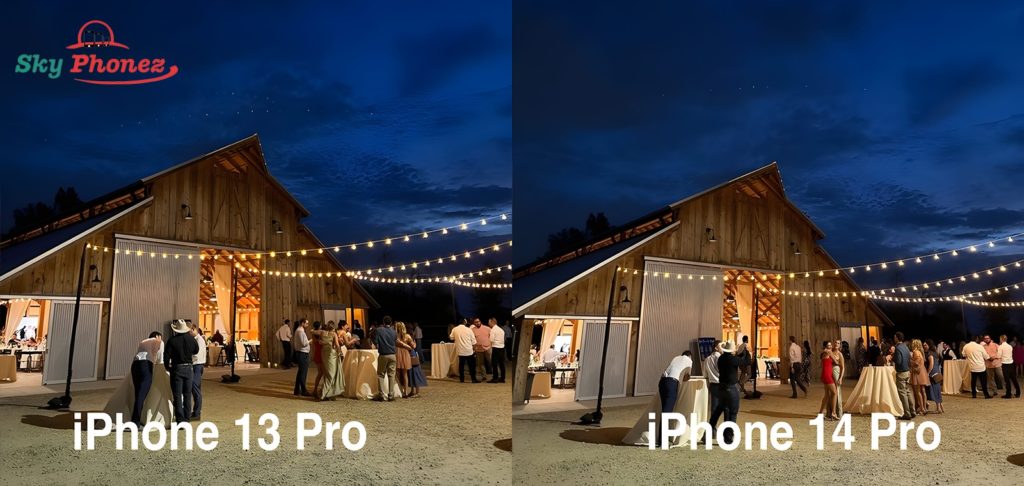
The Balance Between Hardware and Computational Photography
In smartphone photography, the iPhone 14 Pro and 13 Pro showcase a remarkable balance between cutting-edge hardware and sophisticated computational photography. The 14 Pro, with its advanced sensor and image processing algorithms, takes this synergy to new heights.
- The iPhone 13 Pro’s ProRAW capabilities and LiDAR scanner have set a high bar for image detail and depth sensing.
- Apple’s commitment to true-to-life colours and dynamic range is evident in both models, thanks to their computational photography prowess.
The interplay between hardware and software is crucial. It’s not just about the number of megapixels or the size of the sensor; it’s how these elements are harnessed by the device’s processing power to deliver stunning images.
Ultimately, the choice between the iPhone 14 Pro and 13 Pro may come down to personal preference and the importance of the latest features. However, both devices stand as testaments to Apple’s dedication to photographic excellence.
Is the Upgrade Worth it?
When considering the upgrade from the iPhone 13 Pro to the iPhone 14 Pro, it’s essential to weigh the enhancements against the cost. The iPhone 14 Pro introduces a new camera system, improved processing capabilities, and a range of features that may tip the scales for avid photographers and tech enthusiasts.
- Camera System: The leap to a 48-megapixel sensor offers a significant resolution boost.
- Photonic Engine: Enhanced image processing for better low-light performance.
- Action Mode: A game-changer for stabilizing video recordings.
The decision to upgrade is not just about the camera’s hardware but also the software that drives it. The 14 Pro’s Photonic Engine and Action Mode represent the latest in Apple’s computational photography advancements.
Ultimately, the choice to upgrade will depend on individual needs and the value placed on the latest technological improvements. For those who prioritize cutting-edge camera capabilities, the iPhone 14 Pro is a compelling choice. However, the iPhone 13 Pro remains a powerful contender, especially for users whose demands are well-served by the previous generation’s features.
The 13 Pro’s Legacy: Still a Solid Contender
Despite the advancements in the iPhone 14 Pro, the iPhone 13 Pro remains a great player in the camera game. Its ProRAW capabilities and LiDAR scanner continue to attract pro photographers and camera enthusiasts. The emphasis on computational photography ensures true-to-life colours and an impressive dynamic range, maintaining its relevance even as newer models emerge.
While the iPhone 15 Pro Max and competitors like the Samsung Galaxy S24 Ultra and Pixel 8 Pro offer advanced features, the 13 Pro’s balance of hardware and software still delivers exceptional results. Its legacy is not just about the hardware but also the flexibility it offers in post-processing, which is crucial for photographers who demand control over their final images.
The iPhone 13 Pro’s camera system is a testament to Apple’s commitment to quality and innovation, and it continues to be a strong choice for users who prioritize photography.
For those considering whether to upgrade or choose the 13 Pro over other models, here’s a quick comparison:
- ProRAW and LiDAR for detailed photography
- True-to-life colours with an excellent dynamic range
- Post-processing flexibility
- A balance of computational photography and hardware
Conclusion:
The iPhone 14 Pro emerges as a significant step forward in Apple’s camera technology, with its 48-megapixel main sensor and improved low-light performance setting a new standard for mobile photography. The ability to shoot 12-megapixel photos at 2x optical zoom without loss of detail is a game-changer for users seeking versatility without compromise. While the iPhone 13 Pro remains a formidable contender with its ProRAW capabilities and LiDAR scanner, the 14 Pro’s advancements in hardware and image processing pipeline offer a more refined and powerful photographic experience. For those who prioritize cutting-edge camera features and the latest improvements, the iPhone 14 Pro is the clear choice. However, the iPhone 13 Pro still stands as an impressive option for those who value the established quality and performance of Apple’s camera systems.
Frequently Asked Questions
When was the iPhone 14 Pro released?
The iPhone 14 Pro release date was September 16, 2022. The phone identifies key technological improvements from Apple in terms of hardware and software. The quad-pixel 48 MP primary camera, Cinematic Mode, and Photonic Engine make it an adorable camera phone with awe-inspiring performance.
What is the main difference between the iPhone 14 Pro and 13 Pro cameras?
The main difference is the iPhone 14 Pro’s new 48-megapixel sensor on the main wide camera, which is also physically larger, allowing for more detailed photos and 2x optical zoom capabilities.
How does the iPhone 14 Pro’s camera perform in low light compared to the 13 Pro?
The iPhone 14 Pro has a new image processing pipeline and a larger sensor that significantly improves performance in medium to low-light conditions, enhancing night-mode photography.
What is Action Mode in the iPhone 14 Pro?
Action Mode is a feature in the iPhone 14 Pro that enhances video recording, especially for fast-moving scenes, providing smoother and more stable footage.
Can both the iPhone 14 Pro and 13 Pro record in 4K at 60fps?
Yes, both the iPhone 14 Pro and iPhone 13 Pro can shoot video in 4K resolution at up to 60 frames per second.
Is it worth upgrading from the iPhone 13 Pro to the 14 Pro for camera capabilities?
The iPhone 14 Pro offers significant camera improvements, particularly with its 48-megapixel sensor and low-light performance. However, the iPhone 13 Pro is still impressive, making the decision to upgrade dependent on individual needs and priorities.
How does the iPhone 13 Pro’s camera maintain relevance despite the advancements in the 14 Pro?
The iPhone 13 Pro’s camera is still competitive due to Apple’s focus on computational photography, which ensures true-to-life colours and excellent dynamic range, along with features like ProRAW and a LiDAR scanner for professional photography.